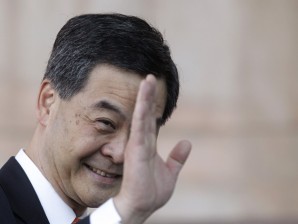Hong Kong – Former government adviser and property consultant Leung Chun-ying won Hong Kong’s leadership election on Sunday, after the most divisive vote since the city reverted to Chinese rule in 1997.
Leung, 57, will replace outgoing chief executive Donald Tsang in June after winning 689 of the votes from the 1,200-strong election committee that chooses the southern Chinese city’s leader, according to an official count.
Applause broke out from delegates on the floor of the room where the election count was held as his tally ticked past the 601 minimum required for victory.
His main rival, Henry Tang, finished with 285 votes and pro-democracy candidate Albert Ho on 76. Thousands of protesters gathered outside the harborside convention centre where the vote took place, demanding full democracy in the semi-autonomous former British colony.
The protests, which could be heard inside the tally room, were noisy but generally peaceful. Some protesters tried to force their way into the convention centre but were held back by police.
Leung, whose humble origins as a policeman’s son stand in stark contrast to Tang’s background as heir to a textile fortune, told reporters earlier that he wanted the broadest possible community support.
“Every resident has their own view about the election. I will try my best to get rid of people’s negative perception about this election,” he said.
The committee is packed with mainly pro-Beijing members of the business and political elite, leading to anger among ordinary Hong Kongers about the lack of a transparent and open election process.
The vast majority of Hong Kong’s seven million residents are excluded from the “small circle” poll, carried out according to the One Country, Two Systems arrangement in place since the 1997 handover from Britain.
Committee members such as Asia’s richest man, Li Ka-shing, and property tycoon Thomas Kwok Ping-kwong were mobbed by reporters and harassed by protesters as they arrived to cast their ballots.
Activists and committee members from the Hong Kong Social Workers’ General Union shouted slogans such as “Get rid of small-circle”, “Give us direct elections” and “Don’t vote, don’t vote”.
Radical lawmaker Leung Kwok-hung arrived in a yellow emperor suit, a pig-wolf mask and holding a papier-mache Chinese tank, shouting “I am the king and kingmaker”, in a theatrical parody of the election process.
Leung was considered an outsider at the start of the race, with insufficient experience of business and government and too little support from the city’s tycoons to win Beijing’s express backing.
Tang, 59, was initially seen as Beijing’s choice but his campaign faltered in a series of scandals, including the discovery of a huge illegal entertainment suite in his home and an admission of marital infidelity.
His popular approval ratings, while never high, plunged dramatically and his wealthy backers were forced to reconsider their positions, leading to an unprecedented split in the establishment camp.
Outgoing leader Tsang and his predecessor, Tung Chee-hwa, the city’s first post-handover leader, were by contrast elected virtually unopposed after receiving the clear backing of Beijing.
“I have no confidence in the election… Beijing is controlling this election and they have chosen CY (Leung),” said education sector employee Alice Chan, who was not protesting.
Hong Kong has a semi-autonomous status that guarantees broad social freedoms under limited democracy. China has promised direct elections for chief executive in 2017, while reserving the right to vet the candidates.
The 2012 election has been complicated by the behind-the-scenes machinations of mainland China’s own once-in-a-decade leadership struggle, with various factions seeking to flex their muscles ahead of the transition later this year.
Allan Zeman, a colourful German-born committee member and chairman of the Ocean Park tourist attraction, said he would support Leung while “looking forward to 2017 when everyone can vote and when we have a proper election”.
“This is a very, very difficult election which we have never seen before… It’s important for CY that if he wins, he will be able to pull everyone together,” he told reporters.
An unofficial popular election, organized by the University of Hong Kong and held online and at 17 mobile polling booths, saw 54 percent of more than 220,000 voters cast blank ballots, rejecting all the candidates.
Police reportedly arrested two people in connection with an attempt to hack the website and bring down its servers.
Originally posted at 12:53 pm | Sunday, March 25, 2012


